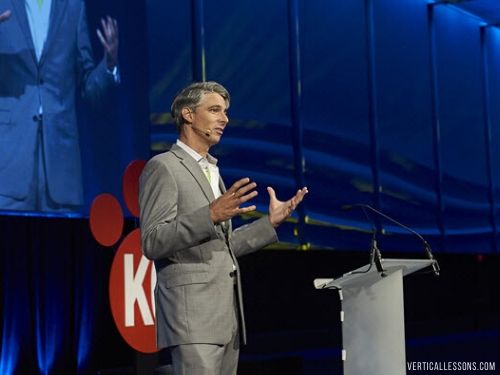Perhaps you already consider yourself a leader. Or maybe you think, “I don’t have anyone who reports directly to me, but I do want more influence.”
That’s what leadership is all about: having a greater impact and serving those you work with better.
Imagine being onstage in front of hundreds of people and having to admit that you screwed up.
Recently, I was giving a keynote address in front of a large audience, and about twenty minutes into my speech, I looked at my laptop and discovered it was almost out of power. Now, I could have responded in a couple of ways.
First, I could have mentioned this problem to the conference organizers and had the audio-visual team help me correct it. This solution would have implied that the conference organizers had created my problem. I also could have created a distraction for the audience by having them interact with each other while I corrected the mistake.
But I didn’t do either of these things. Instead, I actually called myself out immediately. I told the audience, “I need to let you all know that I screwed up and I didn’t plug in my laptop this morning. I’m human. I’ve made a mistake.”

I owned the misstep and doing that made me incredibly uncomfortable. But not blaming anyone else was the right thing to do.
Then, I fixed the issue quickly and fairly seamlessly: I continued the speech, grabbed my power adapter from off-stage, and connected my laptop to an outlet. After my keynote speech, I got tremendously positive feedback, which usually follows my talks.
That day, however, I had a conversation with a gentleman over lunch, and we got into the topics of trust, integrity, and leadership. He brought up the moment when I’d admitted not having powered my computer up and said, “What you do was incredibly powerful. By being so real and transparent and owning up to your mistake, you built trust with me even though you and I are complete strangers.”
It can feel uncomfortable to admit your own error, but that candor always pays off. I’ve noticed this dynamic at work not only on the speakers’ stage, but also in the corporate environment.
A few years ago, I accidentally created a problem that cost the company where I then worked several thousand dollars. It was my mistake, no question about it. I knew that my actions had caused the financial loss. I immediately reached out to our chief financial officer and called myself out. Not only did the chief financial officer support me, but an entire team actually surrounded me and marshaled their skills to help resolve the issue as best they could.

Even though the company still lost money, my actions built an unexpectedly deep level of trust between me and this team and indeed with me and all of my coworkers.
Every time I’ve taken responsibility for my mistakes, it’s been worth it. Every time I’ve stepped up to be accountable, and done the right thing by calling myself out, it’s always paid off.
I want to invite and encourage you to do the same. The act of calling yourself out builds an incredible amount of trust, which in turn builds influence. That influence helps you serve and support those around you as a leader.
Call yourself out on your mistakes and watch your leadership influence grow through trust.
So, what are your thoughts on this issue?
I would love to see your comments below. And please share if you agree and you want to spread this little, but meaningful, message to people out there.
I appreciate you. Thank you.








This came at a really good time for me. I am using this today. Thank you Manley
Thank you Swathy!
Dear Manley,
I had the opportunity to meet you a few years back. What an experience that was. I wish my current situation at work within my senior leadership would take note of your article. I’ve been a long time public servant with a combined military service and public service of greater than 20 years now and I have always found that integrity is not a skill you can teach, but something you’re born with. Individuals within my organization have created a very unhealthy work environment based on poor decisions. It is to the point staff has created a coalition to demand answers from senior leadership. As a leader in the organization I am being pushed and pulled by my staff and senior leadership. Staff is demanding answers I cannot provide, and senior leadership is not answering my calls for help. I’m not sure what the end result will be, but I too intend to own my mistakes no matter how big or small they are. Just ask my wife she lets me practice on her all the time.
Thanks for being an advocate for strong leadership, it is something our country is lacking right now, not just politically but in business and local government, and personally I think mid level and senior managers need to do a better job of mentoring our younger/greener staff. We often want to blame generational nuances for lack of performance in the work place. I wholeheartedly disagree. With the proper training and grooming our governments and businesses can be much better places to work when we invest in our staff and allow them the ability to make a mistake, and then stand up to fight behind them similar to your experience. We are all often too afraid of losing our jobs or the faith of our subordinates or a lack of trust in our senior leaders, we forget the fact that we all have one commonality, we’re human. And we all do make mistakes in business and in life. As a society we need to be better at allowing people to make mistakes. In some cases yes, folks will lose their job if the error is so major, but as leaders we should have the capacity to catch those mistakes and protect our subordinates, and not be trying to do the work of 2-3 FTE, plus have oversight of our staff’s work.
Long story short, there is a lot broken in business, but I wish there was more of a safe space for folks to admit their mistakes in the work environment.
Thanks for your reply Paul. I’m sorry to hear about the challenges of your work culture, but I encourage you to keep showing up with integrity and influence every day. I know your people notice the difference, and you have the courage to not compromise your approach.
I was there, Manley and yes, it made you seem authentic and humble – and human!
Your “recovery” (although it didn’t teally seem like a stumble) was seamless.
Thanks for a great Keynote!
I’ll take this tip onboard, thanks.
Thank you Maura! That was a great experience!